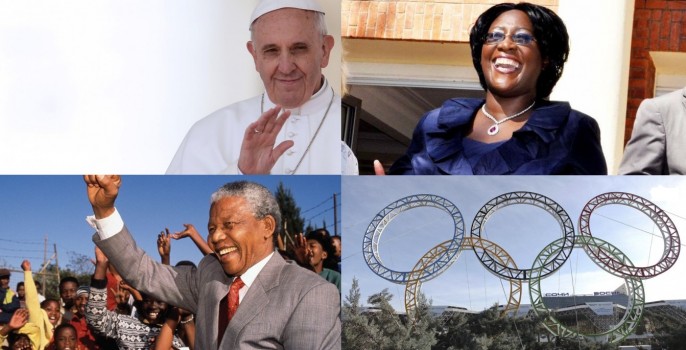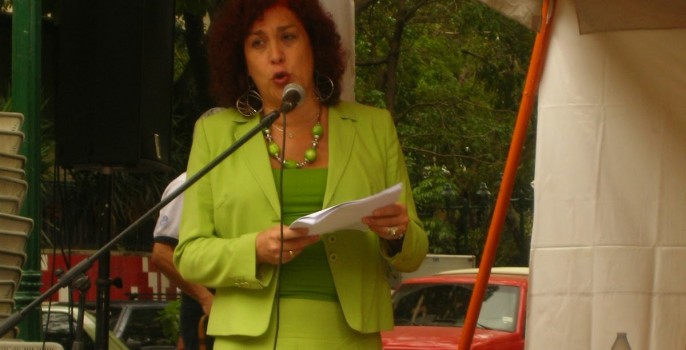2013 was the year that same-sex marriage went global, but it was also marked by significant setbacks in the fight for LGBT rights worldwide – from Russia, to India, to Nigeria and Uganda, LGBT and human activists were moved to answer tough questions in 2013. Here we reflect back on the year, and forward to the rest of 2014, with a resilient message and call to action.
More countries passed laws recognising same-sex marriage in 2013 than in any other year. Uruguay, Brazil, New Zealand, the United Kingdom and France all passed laws in favour. A massive 10 states in the US also passed laws recognising same-sex marriage in 2013 – more than all the previous years put together. Six Native American jurisdictions also legalised same-sex marriage, or performed the first same-sex wedding ceremonies in 2013 (bringing the total to eight). In South-East Asia too, same-sex marriage emerged as a key battleground for activists, with Vietnam approving a law which decriminalises same sex weddings and extends partner benefits. A flagship civil partnership law reached the parliamentary debate stage in Thailand.
With Barack Obama and David Cameron joining the list of heads of states speaking out in favour of LGBT rights, an unlikely figure also entered the fray in 2013. Pope Francis, in a clear break with his predecessor, made a number of statements calling for tolerance and dialogue on the topic of gay and lesbian rights. He even launched a comprehensive worldwide consultation on moral and social issues affecting the contemporary Church – key amongst them, gay rights.
2013 also saw more and more voices join together in favour of human rights for all within the United Nations. The pioneering UN-backed LGBT rights campaign ‘Free and Equal‘ was launched in July 2013. UN Secretary-General Ban Ki-moon also issued a moving declaration in favour of LGBT rights, in honour of the International Day Against Homophobia & Transphobia 2013.
The year also saw some advances in gender recognition laws. Progressive legislation was passed in Taiwanand the Netherlands. The effects of the 2012 Argentinian gender recognition law – the most progressive in the world – also began to ripple through in 2013, with six-year-old Lulu becoming the youngest ever person to be legally recognised as a gender different from that stated on their birth certificate. In South Korea, a landmarkdistrict court ruling also went in favour of trans rights, extending gender recognition protections to five trans men, regardless of medical interventions.
2013 was also a quite positive, if still complex year for intersex rights. Germany joined Australia as only the second country in the world to allow parents, and/or medics, to leave gender blank on birth certificates. The law has, however, attracted due criticism from campaigners who highlight that – given the wording of the law, and stigma around gender non-conformity – it may actually increase pressure on parents to pursue surgery. In February 2013, intersex rights advocates celebrated a declaration by the United Nations Special Rapporteur on Torture, calling for countries to reject ‘forced genital-normalizing surgery’.
In terms of third gender recognition, Bangladesh took the pioneering and widely celebrated step of extending gender recognition rights to hijra communities in November 2013. The country now joins Nepal and Pakistan in offering the option of identifying as other and/or third gender in official documents.
For all the gains however, 2013 will be likely remembered as a year of significant setbacks in the fight for LGBT rights worldwide.
Developments in Russia helped shape a complex year for international LGBT rights advocates, with many prompted to reflect on a reformed, and increasingly polarised, landscape in international relations around LGBT and human rights. From gay club owners in the US pouring Vodka down the drains, in protest at the Putin administration’s assault on human rights – in the name of ‘propaganda’ – to calls to boycott the Winter Olympics in Sochi, to the late release of Pussy Riot and the Arctic 30, it was Russia which dominated discussions around LGBT and human rights in 2013.
Late blows in India, Nigeria and Uganda, moreover, moved many to reflect critically on the very possibility, and ethics, of international solidarity efforts. And, since many of the setbacks of 2013 were framed as defensive measures designed to protect ‘traditional values’ against ‘Western-led’ incursions, such reflection was rendered particularly acute.
In Russia, India, Nigeria and Uganda (as well as Latvia, Estonia, Georgia, Costa Rica, Senegal, and many other countries), anti-democratic politicians wielded the advance of gay rights globally – as an opportunity to push back on human rights protections locally.
Indeed, a stark contrast stares back upon closer reflection on the year:
Whilst a record breaking number of countries passed same-sex marriage legislation, no country decriminalised same-sex relationships in 2013.
Moreover, India re-criminalised them, whilst various countries toughened already draconian laws, tabled bills designed to remove fundamental human rights, and actively turned a blind eye to violent attacks on LGBT communities.
Against the tide of ‘homosexual propaganda’ laws and discussion, in Russia, Eastern Europe and Central Asia,Moldova stood alone as the only country to abandon its pursuit of repressive ‘propaganda’ inspired laws in 2013.
The ‘right side of history’, it seems, is not always a linear march for progress, but a fight paved with setbacks, and tough questions.
The death of Nelson Mandela in December 2013 – a shining light for anti-imperialist struggle as well as for human rights, including LGBT rights worldwide – also threw many of these questions into relief.
And yet, within the soul searching and often bruising reflections, and tragic losses of 2013, a number of positives for international solidarity still stand out.
That Putin is now yielding to pressure, at least visibly, to show his government’s commitment to basic human rights would surely not have happened without all of the efforts of Russian and international LGBT and human rights advocates, and ordinary people everywhere who sent letters, organised protests and argued, relentlessly, for the importance of basic human dignity and respect. As the Winter Olympics in Sochi (February 7 – 23) approach, all eyes will be fixed on Russia’s human rights record, and the sincerity of Putin’s latest moves.
That Zambia’s first lady spoke out against discrimination on the basis of sexual orientation in November 2013, would surely not have happened, without international pressure for human rights recognition for LGBT communities.
That many eyes are set on Belize, as perhaps the next country to decriminalise same-sex relationships, is testament to the courageous work of local activists, who have not and will not give up on the fight for human rights for all.
And, as one activist within our networks also pointed out, reflecting back on the year: “Do remember that Scott Lively got successfully sued, by Ugandan activists!”
Churlish as it might seem to end on that, it is a case which testifies to the power and courage of small groups of local activists to fight for changes which count, worldwide.
Hopefully the International Day Against Homophobia & Transphobia 2014 – expected to be marked in 120 countries this year – will also be testament to that spirit, and will help give hope to activists on the frontlines worldwide, still fighting, and still taking steps – however small – towards the full recognition of human rights for all.


